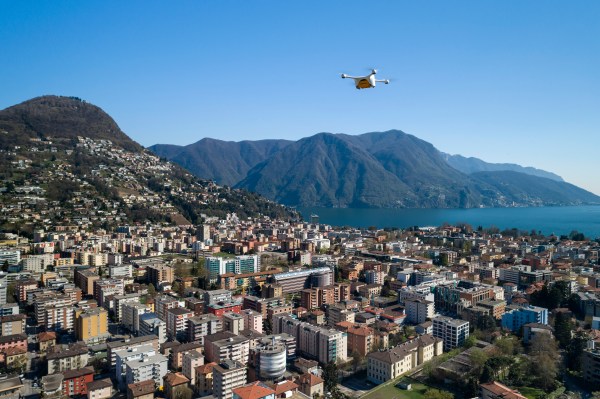The Swiss Federal Office for Civil Aviation (FOCA) has granted Matternet a certification allowing their delivery drones to fly autonomously over cities at any time of day or night. Clearing this regulatory hurdle means that by early next year, Matternet partner Swiss Post plans to use the drones to deliver blood samples and other small parcels between hospitals in Lugano, a smaller city with a population of about 56,000.
Matternet CEO and cofounder Andreas Raptopoulos said, “This is a big milestone for us. It means we can operate our technology throughout Switzerland. This will open a big opportunity in medical and e-commerce.” He emphasized that Matternet’s systems can be flown with the push of a button, and are authorized to fly “beyond the line of sight,” in Switzerland.
Delivery drone competitors such as Zipline or Flirtey build unmanned aerial vehicles and will fly them on behalf of their clients. Matternet, instead, aims to sell its technology to logistics providers.
The Matternet M2 drones that attained clearance in Switzerland have a maximum range of 20 kilometers or about 12 miles, and can carry a 2 kilogram payload. They fly at an average speed of 36 kilometers or 22 miles per hour. The drones are quadcopters with duplicate sensors and autopilot systems on board. If all on-board electronics fail, the drones release a parachute and land. The drones fly from and land on a base that transmits an infrared signal “to ensure a pinpoint landing,” the company says.
Earlier this month, Swiss Post and Matternet launched a “joint innovation project” with the Ticino-based EOC hospital group to begin testing drone deliveries between a couple of their hospitals in Lugano. Previously, the hospitals transported samples on the road, where traffic would sometimes interfere with urgent testing needs. The option to fly samples between hospitals, without having to commission piloted helicopters or planes, could alleviate delays in testing and therefore patient care.
Medical delivery is not a new idea for drones. In Germany, DHL developed “parcelcopters,” to deliver medicine to residents of a remote island in the North Sea called Juist. And in Rwanda, Zipline delivers blood and medical supplies to hospitals and clinics through a program with the government, there.
However, Matternet’s effort with Swiss Post and Ticino EOC hospital group may be the first time that drones are used for medical delivery in a more densely populated market in the developed world.
Swiss Post established their partnership with Matternet two years ago. The companies must still attain a separate safety certification for the packaging that will contain the blood samples, or any other “biohazard” materials, during Matternet drone flights. And they plan to engage in further testing of their drone delivery service before Swiss Post makes the medical drone deliveries an official service.
